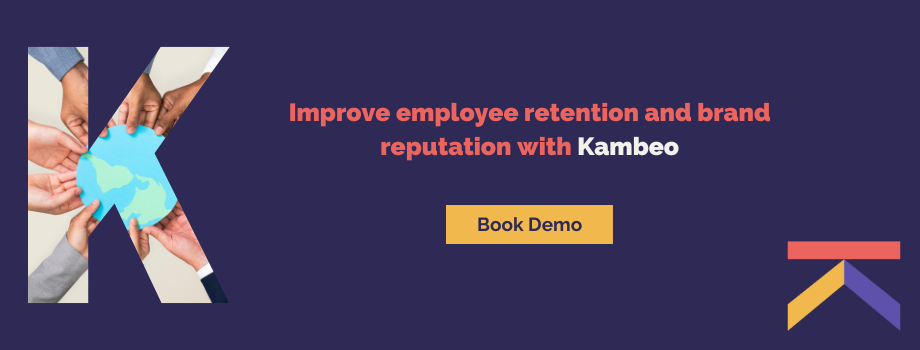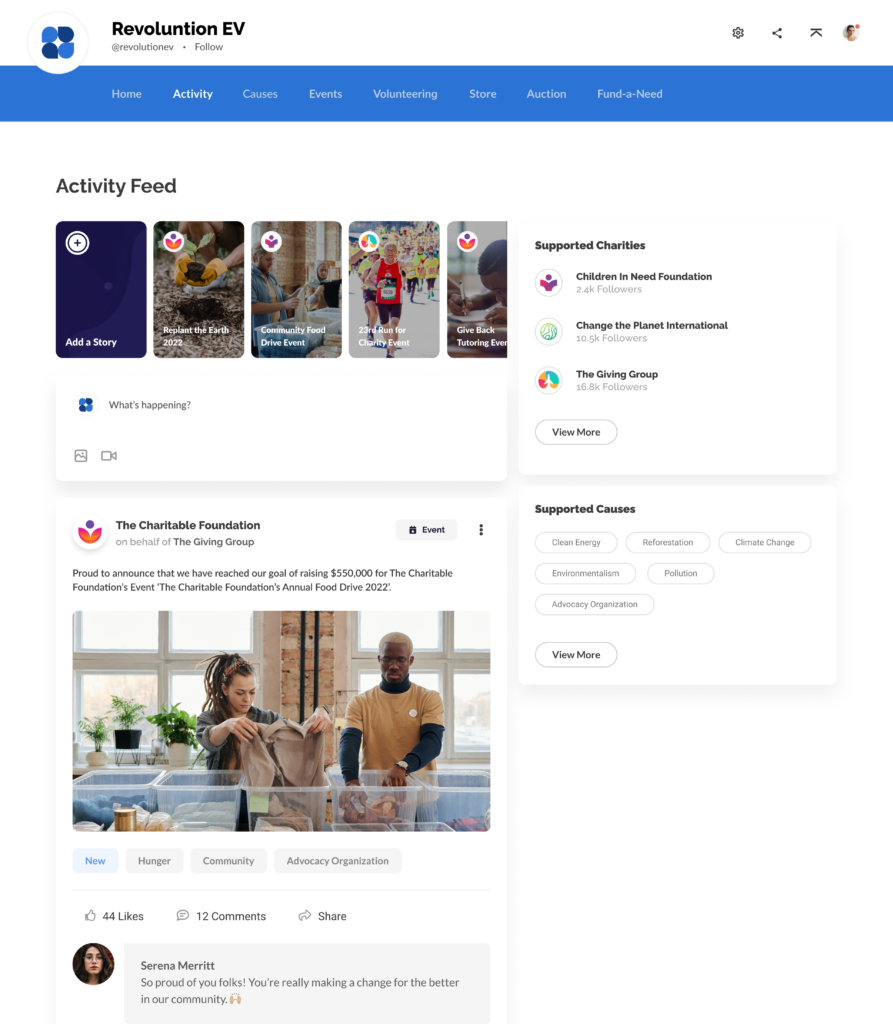Participation, measurement, and communication remain the biggest challenges facing Corporate Social Responsibility (CSR) leaders.
More than 5,000 HR, CSR and ESG professionals were invited to participate in Kambeo’s 2022 CSR Survey. They were asked about their priorities, challenges, and goals moving forward in the social responsibility sphere.
This survey sheds light on the level of CSR investment across multiple industries in Canada and the United States. Responses provide an inside look at how industry professionals rate the outcomes and capabilities of a CSR program.
Alongside the primary findings are actionable takeaways that organizations can implement to enhance their social impact strategy.
Let’s dive into the results:
1. 77% of CSR managers believe that engaging in CSR practices improves brand reputation
What can we learn from this finding?
Participating in fair trade, volunteering in the community, and committing to renewable energy are all examples of CSR practices businesses strive to pursue long-term. Alongside the environmental and social benefits, 77% of CSR managers believe that committing to CSR also helps improve how consumers and employees perceive their brand.
Consumers don’t just consider price and product functionality when making a purchase decision; they look to support companies that operate with moral standards. On the other hand, employees look to work for (and stay with) companies that are purpose-driven and committed to more than achieving revenue targets.
Therefore, it’s imperative that companies focus on contributing their time and skills to becoming a socially conscious brand: one that connects with charities and nonprofits, contributes to a cleaner environment, and partakes in social good initiatives to uplift society.
2. 82% of CSR managers who encourage regular CSR activity agree that it has resulted in higher levels of employee engagement
What can we learn from this finding?
CSR is proven to strengthen employees’ sense of belonging and connection to their organization. It’s naive to think that climbing the corporate ladder isn’t important to employees, but a pay bump and upgraded job title isn’t the end-all solution to employee engagement and retention.
82% of CSR managers agree that when they encourage employees to take action on social good issues, employee engagement increases. Not only should CSR managers regularly encourage participation across company-led fundraisers and volunteer days, but they should adopt an employee-led approach whereby their employees can select which causes they want to support at an individual level.
Therefore, strive to implement employee-led CSR programs where your employees can easily discover charitable causes, find individual volunteer & fundraising opportunities, and share their social impact with team members.

3. 96% of CSR managers agree that the CSR programs they have implemented have helped improve employee retention
96% of CSR managers agree that the CSR programs they have implemented have helped improve employee retention Share on X
What can we learn from this finding?
96% of CSR managers agree that employee retention improves when they unite their employees through a CSR program. Employees want to feel connected to a workplace; a connection where they believe their organization embodies similar values.
As a CSR program values alliance, kindness, and well-being, employees who also believe in these values will feel a sense of belonging to their organization. This enhanced feeling of trust and support arising from the connectedness to their organization is a primary motivator for employees to remain at their company.
Below is an example of three benefits that a CSR program symbolizes, each associated with a specific value:
- Benefit: Help nonprofits in need of financial aid improve the lives of less fortunate individuals.
- Value: Well-being
- Benefit: Pay it forward with actions, such as donations, that bring a smile to someone’s face.
- Value: Kindness
- Benefit: Allocate time to form relationships with individuals involved in charities and nonprofits.
- Value: Alliance
4. 81% of CSR managers find it difficult to measure the results of their CSR activities
What can we learn from this finding?
Companies are frequently partaking in CSR activities that work to positively impact society, such as protecting the environment, helping communities thrive, and prioritizing inclusion & diversity. However, when it comes time to measure the results of their CSR activities, 81% of CSR managers are unable to quantify their progress.
How can CSR activities be measured?
- Calculate the value of volunteer time- Nonprofits and charities typically use the value of volunteer time to determine the amount of community support received from volunteers. The latest value of a volunteer hour is estimated to be $29.95. For example, suppose Company ABC has achieved 150 volunteer hours in one year. The total ‘value’ of volunteer time would be:
- 150 hours x $29.95= $4,492.50
- Match each CSR activity to a KPI- For example, Company ABC works to streamline its supply chain. To quantify the impact of this initiative, Company ABC will use the KPI % of water consumption reduced as a baseline to measure its progress.
- Utilize benchmarks– Company ABC utilizes industry benchmarks as a reference point to assess its water consumption levels in comparison to the industry average.
- Record milestones- Using industry benchmarks, Company ABC identifies months when the % of water consumption reduced has exceeded the industry average. These performance milestones provide a snapshot of their achievements.
5. 68% of CSR managers find it difficult to communicate their CSR output
What can we learn from this finding?
Companies have taken the pledge to commit to making the world a better place. Yet, where is one communication outlet where their stakeholders can see all of the good they are doing?
68% of CSR managers find it difficult to communicate their CSR output because there isn’t one communication channel solely dedicated to social good. Social media networks are an adequate option, as each post is guaranteed to reach at least a small fraction of a company’s stakeholders.
However, when companies aim to share how much money they recently fundraised or how many volunteer hours their employees accumulated from a beach clean-up day, these posts don’t get the recognition they deserve. Instead, they become just another one of the hundreds of posts that appear on a follower’s feed every day, getting lost in the mix of promotional, lifestyle, and current events posts.
Until recently, there hasn’t been a communication channel solely dedicated to social good. Companies are increasingly discovering the power of a social impact platform that allows them to authentically demonstrate their CSR efforts with real-time, verified metrics.

Survey Methodology:
From May 1 to July 31, 2022, 5,326 professionals were invited to participate in Kambeo’s 2022 CSR Survey. Participants included Environmental, Social and Governance (ESG), Corporate Social Responsibility (CSR), and Human Resource (HR) Managers, Directors and Executives.
Industries:
- Computer Software
- Financial Services
- Telecommunications
- Retail
- Marketing & Advertising
- Construction
Markets:
- United States
- Canada
Company size:
- 51 to 1,000 employees
Kambeo: A Social Impact Platform For All
Kambeo is the first-ever social impact platform where employees can build their own social good profile to share their philanthropic accomplishments while also having the ability to track their volunteer, donation, and fundraising contributions over time.
Alongside employee use, Kambeo enables organizations to set up a centralized Hub. One place where organizations can find causes to support as a company, create unity among employees, track social impact, and share their progress with the world.



